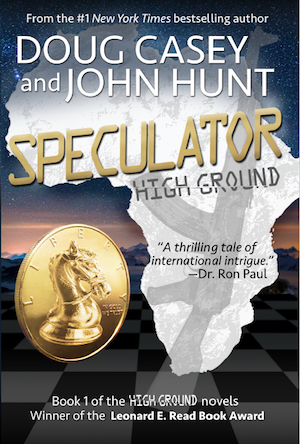
Let’s discuss words. Many of the words you hear, especially on television and other media, are confused, conflated, or completely misused. Many recent changes in the way words are used are corrupting the language. The corruption of language is adding to the corruption of civilization itself.
Words are extremely important because they provide the most important means we have to communicate with each other. If you don’t mean what you say and say what you mean, then it’s impossible to communicate accurately. Do you remember that famous line at the end of Cool Hand Luke, when Paul Newman gets shot? “What we’ve got here is failure to communicate”? That’s what I want to talk about.
Where shall I start, because there are over a million words in English? I’ve rather arbitrarily chosen a few that are especially relevant to investors and freedom lovers. Many of these words are popular with the political classes.
For instance, stimulate the economy. That phrase came out in the ’60s. It really just means “print up money.” They don’t use it much anymore because they can see it no longer results in stimulus; rather, the opposite. Now it’s called quantitative easing. And everybody uses it without questioning the fact that it means “print money,” “inflate the currency,” or “debase the currency.” They say “quantitative easing” with no irony. It makes me think the chattering classes are actually, in reality, quite stupid. I’ll discuss that word—“stupid”—later.
The “powers that be” use a word, and all the jabbering monkeys follow their lead using the same word. I advise you to call them on it. When you use the enemy’s language, you’re playing the enemy’s game on his field. And you can’t win a battle when you do that.
You may have noticed, for instance, that over the last 10 years, they only talk about gold in terms of tonnes. Not ounces, tonnes. This is doubly confusing to the average guy. Because they’re basically innumerate. Most people are unaware that there are two kinds of tons. There are metric tonnes, which are 1,000 kilos, or 2,204 pounds. And English, or short tons, of 2,000 pounds. And a lot of times, when I see things written, they’ll write “a ton of gold,” and they spell it T-O-N. It’s totally different from a T-O-N-N-E of gold, but nobody knows that, including the ignorant journalists.
But they shouldn’t be using either “tonnes” or “tons.” If you’re going to price something in ounces, and use something in ounces, and miners report it in ounces, it’s idiotic to insert “tonnes” into the conversation. Nobody buys or sells or uses a tonne of gold. Even though gold is priced in dollars per ounce, you have fools who talk about tons or tonnes—not having a clue how many troy ounces are in either of them. Or even vaguely knowing what a tonne of gold is worth. But it serves to make the subject of gold more confusing, and more irrelevant, to the average guy.

—John Mackey, Founder, Whole Foods Market
Pre-order now
Let’s talk about bonds. I’m short bonds right now. But do you remember when debt instruments used to be called bonds and debentures? That is a critical but totally lost distinction.
A bond is a debt instrument that is guaranteed by a specific asset in addition to the company’s credit. A debenture is a debt instrument that is just guaranteed by the issuer’s general credit.
Whatever happened to debentures? Apparently, they don’t exist anymore. Why? Because although almost all debt instruments are debentures today, they’re now called bonds—which are better than debentures. It’s subtle, dishonest, and indicative of what’s happened to the credit universe in general. Things are made to look better than they, in fact, are.
Another one. Time deposits and demand deposits. Some of you may remember the proper use of those terms. But, now, they’re completely conflated. Banking is actually two totally separate and different businesses combined into one. With time deposits, you give the bank X number of dollars for a specific length of time, and then the bank guarantees you a specific amount of interest.
Why? So it can lend it out at a higher rate of interest for an identical amount of time, generally in a self-liquidating, secured business loan to somebody of substance. Consumer and mortgage loans are out of the question to a sound banker.
Time deposits still—kind of—exist in the form of CDs, but they’ve generally morphed into savings accounts in the common vernacular. And even those have disappeared and have been conflated with demand deposits—called checking accounts by most people. They are totally different animals. At least if you’re running a sound bank. Historically, with checking accounts, the bank doesn’t pay you interest; you pay the bank a fee. Why? For the service of storing your money, and the convenience of writing checks against it. It’s as if you gave your furniture to Allied Van and Storage, paying them to store it. Now, this distinction is totally lost, and they can, in effect, lend your furniture out. This, plus the fractional reserve system, is why all the world’s banks are illiquid, and most are basically bankrupt.
Investment. Savings. Everybody uses these words, often interchangeably. But nobody ever defines them, because they don’t understand what they actually mean. So, they’re misused and conflated. What is investment? “Investment” is the allocation of a certain amount of capital to a productive enterprise, intended to create more capital. It’s like planting a seed. “Savings” is simply putting aside the fruits of past production. You should produce more than you consume. When you set aside the excess, that is savings. Saving creates capital, and with capital, you can invest. But now, the concepts of savings and investment are conflated. The difference between them is undefined and therefore uncertain in the public’s mind.
Speculation. A lot of people think, “Speculation? Oh, that’s gambling.” Well, actually no. Speculation is allocating capital not to create more capital, but to take advantage of distortions and misallocations created in the market—usually by government interference. Gambling is to engage in a game of chance—roulette, dice, or the like. Since most people in the markets have no idea what they’re doing, they actually are gambling—just using their brokerage house as a casino. Perhaps that’s why people conflate the two things.
Shareholders and stakeholders. We all know that a shareholder actually owns a share in a company, but have you noticed that over the last generation shareholders have become less important than stakeholders? Even though stakeholders are just hangers-on, employees, or people who are looking to get in on a shakedown. But everybody slavishly acknowledges, “Yes, we’ve got to look out for the stakeholders.”
Where did that concept come from? It’s a recent creation, but Boobus americanus seems to think it was carved in stone at the country’s founding.
We’re told to protect them, as if they were a valuable and endangered species. I say, “A pox upon stakeholders.” If they want a vote in what a company does, then they ought to become shareholders. Stakeholders are a class of being created out of nothing by cultural Marxists for the purpose of shaking down shareholders.
Inflation. This is one of the most misused words; few even think about its actual meaning. What is inflation? “Well, that’s prices going up.” No, it’s not. To say that is to confuse cause and effect. Inflation is an increase in the money supply. You inflate when the money supply is increased by more than real wealth increases.
Prices go up as a result. People have forgotten about that. Today, inflation seems to come from out of nowhere, like a freak storm. No cause. Unless it’s blamed on the butcher, or the baker, or an evil oil company. Nobody ever thinks it’s a central bank—the Fed in the U.S.—that actually creates more money, and causes inflation.
You’ve heard that the Federal Reserve is trying to create a little bit of inflation because, they say, “A little bit of inflation is good.” No, even a little bit of inflation is deadly poisonous. For two reasons: It creates the business cycle. And it destroys the value of savings. Saving is the basis of capital creation. People who say that a little inflation is a good thing are dangerous fools.
Well, what about deflation? That’s a bad thing, they say. Well, is it? In fact, deflation is a natural thing in a healthy capitalist economy. Why? Because in a healthy capitalist economy, every year, more wealth is created. An increase of wealth means prices, denominated in a sound money, will go down. And when prices go down, it means that the money you saved is worth more. Your standard of living will rise.
Deflation encourages saving. And that’s a good thing, not a bad thing, because remember, savings represents the excess of production over consumption. That’s how you get wealthy, by producing more than you consume and putting aside the difference.
And when you have deflation, where your money becomes more valuable every year, you’re encouraged to save. When the government destroys the currency by inflating it, saving is discouraged. Of course, at this point, because of the unsound monetary system, we might get a catastrophic deflation. A credit collapse.
Another misused word is money. Money can be defined as a medium of exchange and a store of value. Historically, it’s always been something tangible. For instance, cows or salt. The word pecuniary comes from pecus, which is the Latin word for cow. We get salary from the Latin word for salt. But gold and, sometimes, silver have always been preferred as money.
What you’ve got in your wallet, however—those dollar bills—are currency. Currency is a relatively recent invention. It’s the government’s substitute for money. It originated as a receipt for money, i.e., gold. Currency no longer has any relationship to money. And now, forget about even having currency; it’s all about credit. Even currency is going out of circulation with the War on Cash. Soon you’ll only have credit, ephemeral digits in the ether. Everything you buy or sell will go through your bank account, so the powers that be can know exactly what you’re doing. It’ll be pretty much impossible to evade taxes. Or maintain any privacy. The world’s rapidly going in that direction.
It’s a huge mistake, and we should not do that. Wait a minute—what did I just say? I said, “We should.” Those are perfectly fine English words except when they’re used together. We should. You remember Tonto and the Lone Ranger? Do you remember the joke about when they were surrounded by a bunch of hostile Indians—excuse me, Native Americans—and the Lone Ranger says to Tonto, “Tonto, we’re in a lot of trouble.”
And Tonto looks at the Lone Ranger—incidentally, Tonto means “stupid” in Spanish—and says, “What do you mean we, white man?”
We is a dangerous word. Especially when combined with “should.” It often occurs in political speeches or in comments by talking heads. Listen to the imbeciles on TV, and see how many times the words we should occur. I’m sympathetic to Tonto.
Another word the political class uses a lot lately is diversity. “We’ve got to have diversity.” No, we don’t have to have diversity. I don’t see why every room has got to have a few blacks, Hispanics, or women. Well, of course, half of the human race are women. But I occasionally like to go to a men’s club. It’s odd that men are never invited to ladies’ functions—and don’t care.
In fact, birds of a feather usually flock together. This is perfectly natural. I don’t think you need diversity. If you want it in your club, fine. But freedom of association is far, far more important.
I form my friendships based upon neither diversity nor a lack of diversity, although there’s a natural tendency to associate with people like yourself. I form my friendships based upon the character and the beliefs that a person has. The attributes that create diversity are stupid accidentals. The fact that diversity is emphasized draws attention to incidentals like race, sex, and gender, and diverts it from important things like character and beliefs. Diversity has become destructive. Cultural Marxists love it because they hate people.
Unity has also become poisonous. That’s another one moronic politicians love to invoke: “We’ve gotta have unity.” No, we don’t have to have unity. In fact, we shouldn’t have unity. Unity is dangerous. It’s what happens when all the chimpanzees get together and start hooting and panting to create a war. People like Hitler, Stalin, and Mao required unity.
Remember when it was okay to have bank secrecy, or any kind of secrecy? And then secrecy became somehow wrong. So, moral cowards said, “Let’s just have privacy; the word sounds less threatening.” Well, you can forget about privacy, too. Now, you’re just supposed to have transparency. That’s another word that’s just been revitalized in the last politically correct generation or two. It’s promoted by busybodies as a good thing.
Transparency is a condition where everybody can see everything. Frankly, in my life, I don’t want everybody, or anybody for that matter, to see anything; it’s none of their damn business. The ability to maintain privacy or secrecy is one thing that separates civilized men from primitives living in mud huts. I don’t acknowledge either the necessity or the automatic goodness of transparency.
Now, if I own shares in a publicly traded corporation, as a shareholder, I’ll demand transparency from the management. Generally speaking, management shouldn’t be trusted. They’re hired suits, and shareholders should keep them on a short leash. But nobody other than shareholders has a right to demand transparency from a corporation. In general, forget about this word. It’s popular. Everybody uses it. But it should be expunged from your vocabulary simply because it’s become such a favorite of cultural Marxists and busybodies.
This post was previously published on CaseyResearch.com.

